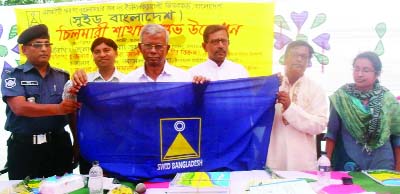
BSS, Rangpur :Speakers at a launching ceremony of a school have stressed on mainstreaming the intellectually disabled children through extending proper supports in flourishing their talents.They said while addressing the ceremony of a school for the intellectually disabled children (Chilmari Branch) at Gabertol village under Thanahat union of Chilmari upazila in Kurigram on Friday.Society for the Welfare of the Intellectually Disabled (SWID) in Bangladesh extended assistance in establishing the school for educating the intellectually disabled and mentally retarded children of the area to make them able and worthy citizens.Chilmari Upazila Chairman Shawkat Ali Sarker, Bir Bikram, inaugurated the school as the chief guest with Convener of Chilmari Branch of the school Gazi Nazrul Islam Sabu in the chair.Chilmari Upazila Nirbahi Officer Aslam Mollah, President of the National Executive Committee of SWID Bangladesh Zaoaherul Islam Mamun, its Member Azharul Azad Jeweler, Officer-in-Charge of Chilmari Thana Moznur Rahman and Upazila Social Service Officer Kazi Fahima Munni addressed as special guests.The speakers said the Department of Social Services under Social Welfare Ministry has identified 18 lakh disabled people, including intellectually disabled and autistic children, in the country through conducting identification survey in 2012.They said SWID Bangladesh has been setting up similar schools in every remote area of the country to ensure proper education to intellectually disabled and autistic children for their rehabilitation and enhanced participations in the nation-building activities.Appreciating SWID Bangladesh for its assistance in launching of the school in Chilmari, the speakers said these schools would play vital role in turning the intellectually disabled, autistic and mentally retarded children into worthy citizens.The chief guest stressed ensuring congenial environment for the autistic children to flourish their latent talents and abilities with an ultimate goal of mainstreaming them with the process of building a developed Bangladesh.He said the intellectually retarded children must be treated as integral part of the society as many of them have already been proving their ability and talent in education, sports and other extracurricular activities like the common children.Media’s role vital in preventing corruptionSpeakers at a views-sharing meeting on Wednesday said the mass media could play the most vital role in mobilising the common people for launching a vigorous movement in preventing corruption from the society.The mass media could play very important role in unveiling corruption, framing corruption as public problem, suggesting solutions and generally empower the common citizens to fight corruption, they said.They put emphasis on educating the school students on values of honesty and good moral character to inspire them in becoming patriotic citizens and having positive impacts on their behavior against corruption to lead the society in future.The District Corruption Prevention Committee (CPC) and District Combined Office of the Anti Corruption Commission (ACC) jointly organised the meeting with media workers at Zila Parishad auditorium in the city.RDRS Bangladesh, a reputed NGO, extended cooperation in organising the meeting under the Justice Reform and Corruption Prevention (JRCP) Project.The Ministry of Law, Justice and Parliamentary Affairs has been implementing the JRCP Project through GO-NGO collaboration under financial assistance of the German Development Cooperation (GIZ).President of the District CPC Professor Mozammel Haque presided over the meeting participated by 40 journalists working in the print, electronic and online media.Deputy Director of District Combined Office of ACC Kamrul Ahsan delivered welcome speech in the meeting moderated by General Secretary of District CPC and valiant freedom fighter Akbar Hossain.Community Intervention Officer of GIZ Mohammad Ali Reza, Assistant Director of the District Combined Office of ACC Atikur Rahman, Rangpur Press Club President Sadrul Alam Dulu, Principal Fakhrul Anam Benzu and Member-secretary of District Community Policing Forum Shushanto Bhowmick addressed.Terming media as the watchdogs, agenda setters and gatekeepers, the speakers said journalists can monitor the quality of governance, frame the discussion about corruption, and lend voice to a wide range of perspectives and arguments.Media coverage influences norms and cultures, which in turn can influence policy-making and legislative reform to influence the range from public awareness on corruption to massive protests against corruption and abuse of power, they said.They said prevention of corruption is not possible only through creation of law and called upon media workers for working as a team to launch an effective social movement involving everybody for eradicating corruption from every sphere of the society.They put emphasis on active cooperation of the media and common people to prevent corruption through stopping misuse of power and public money by a fewer section of government officials and employees.Terming corruption as a social disease, they urged the journalists for stronger media reporting to establish accountability in government offices through raising unequivocal voice against corruption in building a corruption-free Bangladesh.

